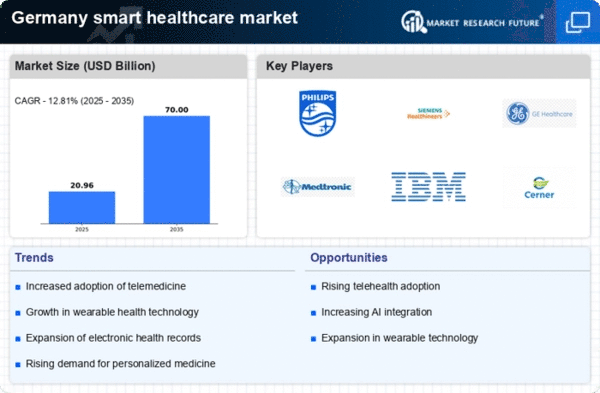Government Initiatives and Funding
The German government plays a crucial role in driving the smart healthcare market through various initiatives and funding programs. The Digital Healthcare Act, implemented in 2019, encourages the adoption of digital health applications and services. This legislation allows patients to access digital health solutions, which are often reimbursed by statutory health insurance. Additionally, the government has earmarked €3 billion for digital health projects, aiming to enhance healthcare delivery and patient outcomes. Such proactive measures indicate a strong commitment to integrating technology into healthcare, which is likely to stimulate market growth and innovation in the smart healthcare market.
Aging Population and Chronic Diseases
Germany's demographic shift towards an aging population is a significant driver of the smart healthcare market. As the proportion of individuals aged 65 and older increases, the prevalence of chronic diseases such as diabetes and cardiovascular conditions rises correspondingly. Reports indicate that by 2030, nearly 30% of the German population will be over 65, necessitating innovative healthcare solutions. Smart healthcare technologies, including remote monitoring and telehealth services, are essential in managing these chronic conditions effectively. The ability to provide continuous care and timely interventions can potentially reduce hospital admissions by 20%, thereby alleviating pressure on the healthcare system.
Increased Focus on Patient-Centric Care
There is a growing emphasis on patient-centric care within the German healthcare system, which significantly influences the smart healthcare market. This approach prioritizes the needs and preferences of patients, encouraging the development of personalized healthcare solutions. Technologies such as mobile health applications and telemedicine platforms empower patients to take an active role in their health management. Research suggests that patient engagement can lead to a 15% improvement in health outcomes. As healthcare providers increasingly adopt these technologies, the demand for smart healthcare solutions is expected to rise, fostering a more responsive and effective healthcare environment.
Technological Advancements in Healthcare
The rapid evolution of technology is a primary driver of the smart healthcare market. Innovations such as artificial intelligence, machine learning, and the Internet of Things (IoT) are transforming healthcare delivery in Germany. These technologies enable real-time monitoring and data analysis, which enhances patient care and operational efficiency. For instance, the integration of AI in diagnostic tools has shown to improve accuracy by up to 30%. Furthermore, the German government has invested heavily in digital health initiatives, allocating approximately €4 billion to support the development of smart healthcare solutions. This investment is likely to foster a more connected healthcare ecosystem, ultimately benefiting patients and providers alike.
Rising Healthcare Costs and Efficiency Needs
The escalating costs associated with healthcare in Germany drive the adoption of smart healthcare solutions. With healthcare expenditure projected to reach €500 billion by 2025, there is an urgent need for efficiency improvements. Smart healthcare technologies, such as electronic health records and automated administrative processes, can streamline operations and reduce costs. Studies indicate that implementing these technologies can lead to a 25% reduction in administrative expenses. As healthcare providers seek to balance quality care with cost containment, the smart healthcare market is likely to experience robust growth, addressing both financial and operational challenges.
















